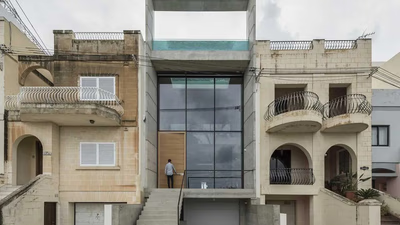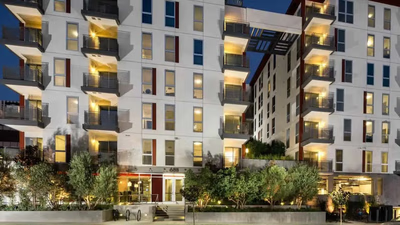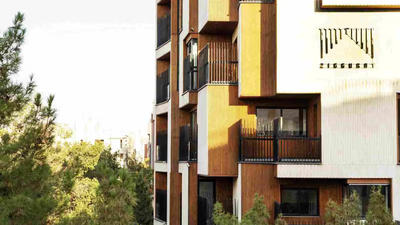
Challenges in Middle East trade impact residential investments.
When considering the purchase of residential property in West Asia, commonly referred to as the Middle East, it is crucial to take into account various factors that can make certain areas less desirable or even risky for investment. These factors may include political instability, economic challenges, security concerns, and lack of infrastructure. Here are some of the worst choices for buying residential property in this region. Syria is a prime example of a country facing multiple challenges. The ongoing civil war, which began in 2011, has resulted in widespread destruction and displacement. The housing market has been severely impacted, and the economy is in shambles, with high inflation, unemployment, and a collapsed infrastructure. Moreover, continuous fighting and the presence of multiple armed groups make Syria a highly dangerous place to live and invest.
Yemen is another country plagued by conflict and instability. Since 2015, Yemen has been embroiled in a brutal civil war, leading to a dire humanitarian crisis. The economy has suffered greatly, with widespread poverty and limited access to basic services. Security issues such as frequent airstrikes, bombings, and armed clashes pose significant risks to residents and investors alike. Iraq, although making progress in recent years, still faces significant challenges. The aftermath of war and ongoing insurgency threats contribute to post-war instability. The economy is struggling, characterized by high unemployment and a heavy reliance on oil revenues. Security threats in the form of terrorist attacks and sectarian violence remain concerns in many parts of the country.
Lebanon is currently undergoing one of the worst economic crises in its history. Hyperinflation, banking collapse, and high debt levels have crippled the nation's economy. Political instability further exacerbates the situation, with frequent power struggles and protests. Infrastructure issues, such as unreliable electricity and water supply, coupled with widespread corruption, make investing in residential property a risky endeavor. The Gaza Strip in the Palestinian Territories faces unique challenges. It is frequently a site of conflict between Israel and Palestinian groups, resulting in destruction and insecurity. The area is under an economic blockade, severely restricting trade and economic growth. Living conditions are poor, with limited access to clean water, electricity, and healthcare, making residential property investment unattractive.
Afghanistan has recently experienced significant political and social upheaval following the Taliban's return to power in 2021. The country heavily relied on international aid, which has been drastically reduced, leading to widespread poverty and economic collapse. The security risks posed by ongoing threats from militant groups further deter potential investors. Libya remains divided and embroiled in civil conflict, with ongoing skirmishes between rival factions. The economy is unstable, heavily dependent on oil, and lacks diversification. Unsafe living conditions prevail due to frequent clashes and the absence of a central authority, making many areas unsafe for residential property investment.
For example, in the past, Saudi Arabia has faced restrictions in the field of human rights, freedom of expression and lack of attention to women's rights. Also, there are social and cultural restrictions in some areas. Some of the things mentioned about Iran include political, security and human rights restrictions. Also, international economic sanctions have also affected some aspects of life in Iran.
Bahrain has faced political and social tensions in the past. Also, some areas in Bahrain have also faced security instability. As I mentioned earlier, the civil war and political tensions in Syria have caused urban destruction and security threats. The civil war in Syria has caused great destruction to its cities and infrastructure. In addition, political and security instability, international sanctions and lack of strong real estate laws make investing in residential real estate in Syria very risky and unpredictable.
The civil war and political instability in Yemen have caused the destruction of cities and infrastructure. Security threats and political instability discourage investment in residential properties in this area. Iraq has faced political instability, security threats and terrorism in the past. These conditions make investing in residential properties in some areas of Iraq to be associated with high risk. Lebanon has faced political, financial and economic problems in recent years. High inflation, economic instability and political instability make investing in residential real estate in Lebanon a big challenge.
The existence of political instability brings social and political disturbances and unevenness. Sudden changes in government, political tensions, and political instability in countries cause uncertainty for investors in the long term and affect the real estate market. The presence of security threats, including terrorism, security instability, and civil wars, makes investors dissuade from investing in residential properties in these areas. Failure to establish security causes insecurity in daily life and increases risks related to property.
Economic problems such as high inflation, economic disorder, inability to pay international debts and lack of currency stability can cause investors to lack confidence and reduce the value of investing in property. The existence of legal restrictions and inefficient judicial systems can cause investors to be uncertain about property rights and contractual rights. Lack of transparency in real estate laws and corruption in some legal systems make investors prohibited from buying property in these areas.
Investing in residential property in these areas carries significant risks due to political instability, poor economic conditions, and security concerns. Potential investors should conduct thorough research and consider safer regions with more stable economic and political environments to minimize risk and ensure a more favorable investment climate. In West Asia, some areas may not be suitable for residential real estate investment due to various factors including market volatility, political and security instability, legal restrictions and economic problems. It is very difficult to provide a complete list of bad places to live in the Middle East , because the conditions in different areas are always changing, and personal assessment also plays an important role in this regard.



